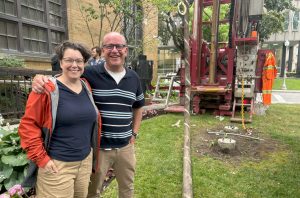It’s the perfect climate for three women to tell their stories about being daughters of survivors.
Floods of immigrants are making the news and playwrights Pearl Lottner Rothenberg and Claudia Litvak Polachek, who were ready to reveal their own stories, found director Rachelle Glait, who could relate to their script.
Daughters of Mile End, which is playing at the D.B. Clarke Theatre in Concordia University’s Hall building, runs from April 3-6. It is the second world premiere for the two-year-old Labyrinth Stage Productions, which was founded by Rothenberg and Polachek.
Last year’s successful Queen of Chesed – which was based on the story of big-hearted New Yorker Faige Jacobson, who took in the homeless – gave the nascent company a solid base from which to build. This year, the playwrights turn their lens upon themselves.
“My mother was a survivor of Auschwitz and Bergen-Belsen. She was 19 when the war started and 25 when it ended, the only survivor of her family. My father was a partisan in the woods and when he came back to Lvov, no relative was left. Even though my parents never talked about it and kept so many secrets, I grew up knowing that things weren’t quite right,” says Rothenberg, who had a career as a psychologist before retirement brought her to theatre.
READ: NAZI WAR CRIMES LOOM IN QUEBEC-BASED MURDER MYSTERY
Polachek’s parents fled to Chile, before the Nazi chokehold tightened. “We moved to Montreal when I was four. My father was feeling the immigrant experience throughout my entire life,” she says.
Glait’s parents met while self-exiled in Uzbekistan. But her father, the youngest of 14 children and one of only two to survive, was almost mortally wounded in the Kielce pogrom when he returned to Poland to find his siblings.
“The Poles were not happy that the Jews were coming back and smashed him on the head. A doctor examining the bodies on a wagon saw he was still breathing and sent him to hospital,” says Glait. “Eventually, he made his way to Montreal and found work in a factory. He was there at 7 a.m. and came home at 7 at night. We had no relationship, but when he died, I found a shoebox with every review of every play that I’d ever been in.”
The trauma affected their parents’ child-rearing skills, making them either neglectful or overly protective. They struggled for social acceptance in Canada, particularly among native-born Jews, who proved to be the most hurtful.
“One of my new friends called the house and my mother answered. She thought my mother was the cleaning lady,” says Glait. “I was the child of an outsider, so I was an outsider.”
Polachek added that, “My father used to say, ‘Just because I speak with an accent doesn’t mean I think with an accent.’ It comes up as a line in the dialogue.”
In the play, the women tell their stories and amalgamate those of other children of survivors. This is told through four 12-year-old friends growing up in the Esplanade Street area of Montreal in the 1950s. The play follows them over the years, seeing them again when they are 30 and, later, in their 60s. The older cast members also play the mothers of the children.
John Dinning’s set, Mike Sinnott’s lighting and Louise Bourret’s costumes conjure the three different eras as the characters age. And in the time it takes to tell their stories, the words of the playwrights expose their secrets and lead to an understanding that can heal relationships between parents and children, friends and community.
“It’s an emotional investment,” says Rothenberg, of both the personal sharing that took place in writing the play, and the close teamwork of all those involved.
Tickets can be purchased by calling 1-800-838-3006, or visiting brownpapertickets.com/event/4048627.






